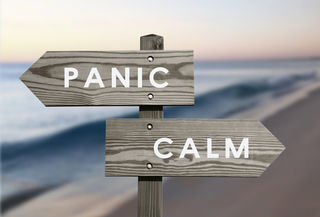Anxiety
Your Panic Is Increasing Your Risk
How to calm intense emotions. Part 3
Posted March 14, 2020 Reviewed by Lybi Ma

Our planet is in fear. But while we are seeing global messages daily to protect our physical health such as washing our hands, social distancing, etc., we are being given very little in terms of our mental/emotional health. The panic surrounding the coronavirus is sweeping our world, and while I am not minimizing the seriousness of the virus, the panic itself is making us all more susceptible to its potential spread. You need emotional tools and practices to keep your immune system healthy to combat the disease, just as you need physical practices, such as washing your hands, to prevent its spread.
Your emotional health is intricately linked to your immune system. Your immune system is a collection of billions of cells, and some target organs that have the primary job of keeping you healthy and fighting off disease. Your immune system cells travel throughout your body and defend it against antigens, such as viruses. Unrelenting cortisol, your primary stress hormone, suppresses your immune system by reducing the number of its virus-fighting cells.
To make matters worse, ‘low-grade cortisol baths’ seem to be the biggest immune system culprit of all. These ‘baths’ are smaller influxes of cortisol all day long, primarily due to a stress dominated thought process. It is estimated that we have 60,000-80,000 thoughts a day, primarily repetitive, and primarily negative. When added to the concept that your brain, in many ways, doesn’t know the difference between what you vividly imagine (or worry about) and what is real, you can see the damage your panic may be wreaking on your risk of contracting a circulating virus.

When stress, anxiety, worry, overwhelm, depression and isolation are left unchecked they actually reduce the effectiveness of your immune system and make you, and those around you much more susceptible to getting sick. When your immune system is challenged you are more likely to contract and spread a circulating virus and expose those around you, your communities, and our global population.
Further, children may be especially prone to long term damage to their immune systems through something called early life stress (ELS). Children exposed to ELS have shown long-term compromised immune systems, and children are especially sensitive to picking up the stress and anxiety of the adults around them. In terms of our children’s ELS, we need to learn to calm down.
We owe it to our children, our communities and our global population to pay as much attention to our mental health when facing this pandemic as we do our physical health, as truthfully, they cannot be separated. Our global response so far to this pandemic has seemed to take one of two paths. Either people have succumbed to the panic, and the panic itself now poses a threat to its spread, or have belittled the seriousness of the potential threat of the virus.
There is a third way. We can exercise wise and prudent responses from a public health perspective, and remain calm in the process, adopting tools and practices to enhance our emotional health and the emotional health of those around us.
These tools and practices can include learning to calm your intense emotions as they arise and adopting daily practices and habits that transform your emotional system overall. This is the third in a series on calming intense emotions. Although it is certainly a ‘stand-alone’ article, I encourage you to read “Why You Freak Out”, and “Meet Your Freak-Outs with Understanding and Self-Compassion”. These posts will give you a basic understanding of why you get emotionally triggered in the first place, and why self-compassion in the process is an all-important component to re-balancing your system.

The following practices will help you calm your intense emotions when they arise, reducing your cortisol influx, and calming your system over-all.
The Power of Pause – The Power of Pause invites you to respond differently right in the moment of reactivity. When you recognize a destabilizing emotion is taking over your system, as in fear or worry, you disengage from his hijack, pause and observe your reaction from a third person or witnessing point of view, without suppressing, judgment or engagement. Take a few intentional and slow breaths to calm your physiology, and from a grounded space of equilibrium, you will be more able to discern an appropriate response to the immediate circumstance.
Present Moment Awareness –In Present Moment Awareness, you ground your attention in the present moment and your external surroundings. Doing so takes your mind off your escalating thoughts and begins to calm your whole mind/body complex. First, notice and disengage from the reactivity of your trigger, relax the muscles around your eyes and shoulders, which are directly connected to your emotional response system, and take a few deep breaths. Second, pause and really experience your senses. Fully notice the sites around you, the depth of the colors, the sounds, smells and the details, as if you are hyper-aware of the experience and what it feels like to be fully present in that moment.
Usually, intense emotion is taking you to a different place and time, grounded in worry. Present Moment Awareness asks you to so fully immerse yourself and your senses in your surroundings that it calms your emotional hijack and brings you back to a grounded ‘now’.

HEART in the Moment – HEART (Heartful Emotion Affect Regulation Training) invites you to intentionally engage in an emotional state that is healing and stabilizing. By intentionally engaging in a heart-felt emotion you flip your dominating emotional state from chaos to calm, thus integrating your whole mind/body complex in a grounded and peaceful state. First, notice and disengage from your reactivity, similar to the Power of Pause. Second, refocus your physiological response by relaxing the tiny little muscles around your eyes, relaxing your shoulders, and taking a deep breath. Lastly, nurture a different emotional state by engaging in a heart-felt emotion like authentic gratitude, love or genuine compassion. It is important to really feel this state from an embodied sense.
Besides calming your emotional system in the moment, adopting life practices and ways of being can also calm your fear and panic. Practicing compassion has directly been connected to improving your immune system and stimulating the pro-social networks in your brain, reducing loneliness. Instead of hoarding groceries and completely isolating yourself, find prudent and safe ways to help those in your communities and share resources.
Calm your children by teaching them the self-calming tools suggested here, and spend generative family time instead of being glued to a TV that may be worsening the stress. Spend some time in nature. Find ways to reduce social isolation by connecting through technology or a phone call.

Reducing your fear, stress, and anxiety during this pandemic may be as important to your potential risk as washing your hands. Be prudent with public health concerns, yes, but also take care of yourself, take care of each other, and keep yourself grounded. Remember the importance of your mental health in reducing the risk of coronavirus as we move forward through this uncertain time.




